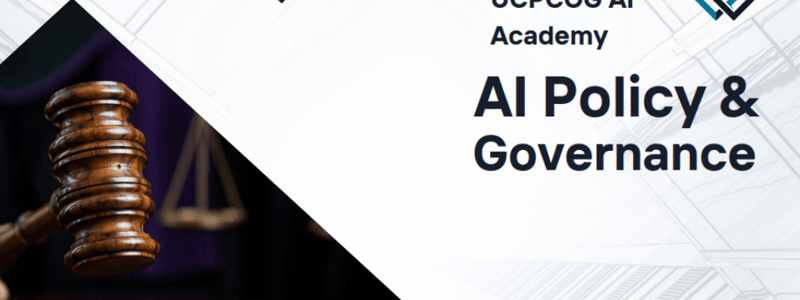Podcast
Questions and Answers
Questions are hidden until you start the quiz
Flashcards
AI Governance
AI Governance
Frameworks, policies, and oversight ensuring responsible AI deployment, risk mitigation, compliance, and protection of community interests.
Why AI Governance Matters
Why AI Governance Matters
Prevents bias, ensures fairness and transparency, and protects data privacy in public service AI applications.
Principles of AI Governance
Principles of AI Governance
Fairness, transparency, privacy, human oversight, and accountability in AI systems.
Trustworthy AI
Trustworthy AI
Signup and view all the flashcards
Core Pillars of Trustworthy AI
Core Pillars of Trustworthy AI
Signup and view all the flashcards
AI Ethics Officer Role
AI Ethics Officer Role
Signup and view all the flashcards
Risk Management Framework
Risk Management Framework
Signup and view all the flashcards
AI Compliance Monitoring
AI Compliance Monitoring
Signup and view all the flashcards
Identifying AI Risks
Identifying AI Risks
Signup and view all the flashcards
Offsite Data Storage Risks
Offsite Data Storage Risks
Signup and view all the flashcards
AI Compliance with Privacy Laws
AI Compliance with Privacy Laws
Signup and view all the flashcards
Transparency and Accountability Mandates
Transparency and Accountability Mandates
Signup and view all the flashcards
Compliance Audits for AI
Compliance Audits for AI
Signup and view all the flashcards
Benefits of AI Chatbots
Benefits of AI Chatbots
Signup and view all the flashcards
Key Lesson: AI Chatbots
Key Lesson: AI Chatbots
Signup and view all the flashcards
Purpose of AI Ethics Committees
Purpose of AI Ethics Committees
Signup and view all the flashcards
Members of AI Ethics Committees
Members of AI Ethics Committees
Signup and view all the flashcards
Future of AI in Local Government
Future of AI in Local Government
Signup and view all the flashcards
Increased AI Regulations
Increased AI Regulations
Signup and view all the flashcards
AI in Everyday Software
AI in Everyday Software
Signup and view all the flashcards
Study Notes
- AI Policy and Governance is essential for mitigating risks, ensuring compliance, and protecting community interests in AI deployment.
- Small towns and counties can adapt AI governance to suit budget constraints and local priorities.
Why AI Governance Matters
- Prevents biased decision-making in public services like law enforcement, housing, and hiring.
- Ensures AI systems are used transparently and fairly for grant management, emergency response, and tax assessments.
- Protects citizens' data privacy when using AI for permit processing or digital records.
Principles of AI Governance
- Fairness and non-discrimination prevents AI from favoring or disadvantaging specific groups.
- Transparency and explainability ensures AI decisions are understandable and justifiable.
- Privacy and security ensures citizens' data is protected from misuse.
- Human oversight is important as AI should assist, not replace, human decision-making.
- Accountability ensures there is clear responsibility for AI-related outcomes.
Understanding Trustworthy AI
- AI should be ethical, reliable, and aligned with legal requirements.
- Trustworthy AI is robust, unbiased, and operates transparently.
- AI should help public sector officials make fair, data-driven decisions while avoiding harm.
Core Pillars of Trustworthy AI
- Safeguard sensitive citizen data.
- Fairness and bias mitigation is important.
- Monitoring and evaluation is a key component.
- Avoid inequalities and ensure fair treatment.
- Conduct frequent and regular assessments.
- Transparency and explainability need to implemented.
- Human-AI collaboration for best results.
- Ensure public trust in AI implementations.
- AI should keep a "human in the loop".
- Implement security and data protection.
Building an AI Governance Review Team
- Define roles - Clarify who is in charge of what tasks.
- Diversify the Team - Include members from more than just the IT Department.
- Establish a review process including data input and AI output.
Roles and Responsibilities in AI Governance
- AI Ethics Officer(s) ensure ethical compliance.
- Data Protection Officers oversee citizen data privacy.
- Compliance and Risk Experts assess AI legal and operational risks.
- AI Developers and IT Dept ensure technical implementation follows policy guidelines.
- Subject Matter Experts ensure data development and data accuracy.
Key Components of an AI Governance Policy
- Purpose and Scope - Define where AI will be used and why.
- Ethical AI Principles – Establish fairness and transparency requirements.
- Risk Management Framework - Plan for potential AI failures and legal risks.
- Audit and Compliance Procedures – Ensure AI systems remain accountable and fair.
- Public Engagement and Transparency. – Create feedback mechanisms for citizens.
Implementing an AI Governance Policy
- Conduct initial AI risk assessments before deployment.
- Define compliance monitoring procedures to prevent misuse.
- Train staff ethics and governance practices.
- Establish continuous review mechanisms to adjust AI policies.
- Ensure accountability at all levels, from mayors to IT staff.
High-Level Risk Management Framework
- Identify Risks – Understand potential AI system failures, biases, and security threats.
- Assess Risks – Evaluate likelihood and impact of risks on operations and community trust.
- Mitigate Risks – Implement bias audits, security patches, and ethical oversight.
- Monitor and Review – Continuously track AI performance and update policies as needed.
- Respond and Adapt – Have incident response plans for unexpected AI failures.
Risks in AI Implementation for Local Governments
- Onsite vs. Offsite Data Storage Risks – Data security concerns arise when outsourcing AI services.
- Data and system security is important no matter who hosts the AI.
- User Management and Control Risks – Assigning the right staff with the right level of permission and access.
- Knowledge Document Risks – AI must be trained on accurate, unbiased government records.
- IT & AI Hosting Risks – Using a single vendor for both IT and AI can create dependency risks.
GovAl User & Data File Management
- UCPCOG is working with GovAl to customize regional permissions and access levels
- Folio types include project folios, special access, departmental folios, departments general, organizational folios, and access for all users
- Key guidelines for using folios
- Define objectives for the folio
- Start with high quality data
- Organize for easy retrieval
- Be diligent with sensitive information
- Ensure data freshness is maintained
- Test for accuracy
- Monitor usage
- Communicate purpose and limitations
GovAI
- Folios help reduce errors/hallucinations by using accurate resources
- Folios give the AI specific context
Folio Timeline and Roadmap
- Introductory webinar today
- Beta access begins now
- Access scoped to specific user, wider adoption to follow
- Feedback and assistance is appreciated
- GovAI Roadmap
- Refining based on Feedback
- Refining Crawlers
- SCIM for Group Management
- Personal Folios
- Q1 Work
- Audio File Transcription
- Teams Bot
- Smart Prompts
- Groundwork for citizen engagement
AI Compliance
- AI in government must comply with:
- Guidelines such as NIST risk management framework
- Privacy laws such as GDPR and CCPA
- State-specific privacy laws
- Transparency and accountability mandates
- Compliance audits ensure that AI policies align with legal and ethical standards
AI Chatbots Case study
- A city deployed AI chatbots for citizen inquiries leading to:
- 40% call center workload reduction
- Faster response times
- Accessibility for non-English speakers
###AI Ethics
- Purpose: monitor, review, and guide AI policies in local government
- Committee members should include:
- Government officials
- AI, IT, and/or data experts
- Community members
- Audits upheld
Future of AI Governance
- AI will continue to expand
- Key trends:
- Increased federal and/or state regulations
- More AI powered public services (chatbots, smart city tech)
- Increased citizen involvement
- Key trends:
Implementation Challenges
- Budget constraints
- Technical Expertise
- Regulatory Uncertainty
- Public Resistance
Overcoming AI challenges
- Seek funding from federal and states
- Train existing staff
- Adopt AI solutions
- Engage with AI experts
AI Training
- AI Literacy
- Workshops and certifications
- Talent development
- Elected officials
Common Hurdles
- Lack of transparency
- Bias in AI Models
- Ignoring public input
- Weak oversight
Best Practices for AI
- Vendor transparency
- Ethical policies
- Data privacy agreements and standards
Measuring Al programs success
- Measure using:
- Performance metrics
- Satisfaction surveys
- Bias detection reports
- Operational cost savings
Citizen Participation
- Ensures aligns with community needs and values
- Strategies can include:
- Community town halls
- Online surveys
- Transparency reports
- Strategies can include:
Ensuring Inclusivity
- AI Powered Language Translation
- Accessible Al Interfaces
- Equitable Service Distribution
- AI Policy Review
Summary & Call to action
- Al governance ensures fair, transparent, and ethical Al use in government
- Includes ongoing education and interagency collaboration
- Implement oversight
- Commit to continuous improvement
- Evaluate current AI policies recognizing any gaps
Studying That Suits You
Use AI to generate personalized quizzes and flashcards to suit your learning preferences.




